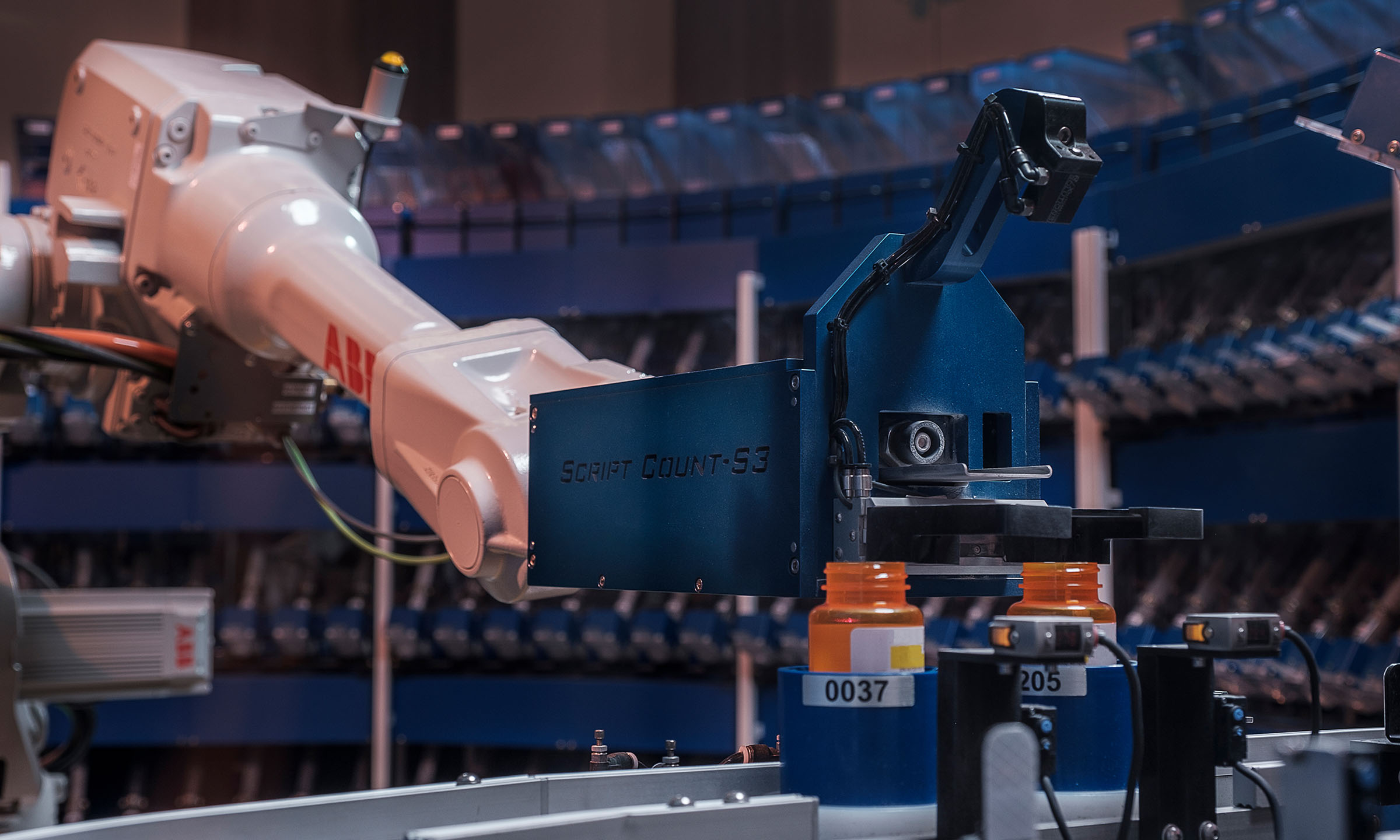3 Benefits to Using Pharmacy Automation Tools to Help Patients
Pharmacy automation tools have been around since the 1960s, and historically, they've largely been a "nice to have" rather than a "need to have” for pharmacies. Then the COVID-19 pandemic accelerated long-simmering patient-consumerism trends within healthcare, and many pharmacies found themselves reconsidering their automation toolkit. Here we examine the benefits that can come by satisfying patient-consumerism expectations around transparency and convenience.

Since its inception in the 1960s, pharmacy automation has been largely a "nice to have" rather than a "need to have” for pharmacies. Then the COVID-19 pandemic accelerated long-simmering patient-consumerism trends within healthcare, and many pharmacies found themselves reconsidering their automation toolkit, including things like centralized dispensing solutions.
Suddenly, automation had become a necessity for pharmacies of every size — not just the larger ones — and adoption of solutions exploded, albeit at different paces considering a pharmacy’s size. For example, pharmacies on the fence about automation solutions finally chose one, while those already invested expanded their locations. There’s reason to believe more growth is in store, too.
In fact, one prediction suggests the global pharmacy automation market will grow at a compound annual rate of 7% over the next five years.Pharmacy Automation Market: Global Industry Trends, Share, Size, Growth, Opportunity and Forecast 2021-2026, Research and Markets, June 21, 2021 Our business has seen growth double — maybe even triple — pre-pandemic levels.
Pharmacies will be grappling for years to come with the ripple effects caused by an ongoing pandemic, including expanded roles for their pharmacists. And seemingly every day, more flexible and intelligent solutions become available for more types of pharmacies than ever before. In other words, between the demand and an ever-increasing supply of options for pharmacies, the sky is the limit.
In this article, I explore three key benefits pharmacies of any size can experience with the strategic use of automation tools.
Editor’s note: A version of this article was first published Sept. 19, 2022, in Chain Drug Review.
Benefit 1: Spend more time with patients
Few in healthcare were swept up in the pandemic’s disruptions quite like pharmacists. Whether it was vaccine administration and consultation or the delivery of medicine to patients’ homes, many pharmacies provided new ways of supporting patients. In response, trust in and dependency on pharmacists increased.
When asked how the COVID-19 pandemic affected their prescription behavior, 27% of patients surveyed for the 2022 Medication Access Report said they relied more on their pharmacist for information about their condition and medication than they had in the past. Eighteen percent said they relied more on their pharmacist to explain benefit and payment options.
This wasn’t just a pandemic trend: Pharmacists’ role in patient care and their ability to impact patient outcomes is expected to keep expanding.Pharmacists Rise to the Challenge of Expanded Roles, Pharmacy Times, Jan. 20, 2021 And this elevation of pharmacists to patient care team members only highlights the need for more time to spend with patients — a shift that’s possible long-term through automation and delegation of tasks that don’t require a human touch. Research from the Journal of American Pharmacists Association, pharmacists can save more than 46.5 minutes per 100 prescriptions filled when using automation tools compared to the traditional count and pour method.Time Savings Associated With Dispensing Unit-of-Use Packages, Journal of the American Pharmacists Association, July 1, 2002
Patients also now have expectations for remote, on-demand access to healthcare providersTelehealth: A quarter-trillion-dollar post-COVID-19 reality? McKinsey, July 9, 2021 New Telehealth Users Expected to Keep Accessing Virtual Care, Society for Human Resource Management, Aug. 11, 2021 — a group that now includes pharmacists. Stronger technologies and software that pharmacies can rely on will be key to their ability to prioritize personal interactions comfortably and put the patient first. And it’s those pharmacies that put customers first that'll likely get ahead in the years to come.
Learn more: 7 benefits you should look for when considering pharmacy automation software
Benefit 2: Create efficiencies and save money
Pharmacies emerged from a second pandemic year embattled but wiser. It’s now a priority to optimize pharmacists’ time and value. But at the start of the pandemic, the outlook was bleak. Amid lockdowns, supply-chain disruptions and the pressure of moving 30-day fills to 90,COVID-19: 90-Day Refills May Strain Supply Chain, Specialty Pharmacy Continuum, April 8, 2020 capacity and resources were strained. Quarantining patients avoided pharmacy stores and switched to home delivery,CoverMyMeds Pharmacist Surveys, 2020-2021 thereby curtailing foot traffic and customer browsing — a strategy many pharmacies previously depended on. Since patients weren’t visiting stores, many pharmacies began looking for ways to meet customers where they were. For some, this resulted in a focus on evolving patient needs like home delivery.
And even as patients have begun to return to stores for in-person visits, consumerism expectations for convenience and transparency remain. Patients have come to love the ease of digital healthcare options, even when in-person ones are available — as shown by the continued use of telehealth. Though utilization isn't where it was during the height of the pandemic, a survey earlier this year found it’s still higher than it was before.38% of Patients Have Received Virtual Care in 2022, mHealth Intelligence, March 4, 2022 The same survey also found patients expect to continue using digital health options in the future, despite the availability of in-person options.
Centralization and automation also soon became key to creating efficiencies and freeing up resources. Instead of manually filling and dispensing drugs using paper-based processes, pharmacies began to rely on multiple sites with automated services, reducing errors and saving time. And, of course, time saved is money saved.
Consider, for instance, that high-volume automated dispensing sites can have a labor cost-to-fill of less than $1 per prescription, compared to the national average of $7.22.CoverMyMeds internal data, 2021; Cost of Dispensing Study, Abt Associates, January 2020 Cost savings are no longer limited to high-volume retail pharmacy chains either. Lowering the lift for pharmacies has helped smaller companies gain the benefits of automation.
In the years ahead, expect even more opportunities to create efficiencies and save money to arise. A significant number of prescriptions that are fully capable of being dispensed through automation — and should be in automation — aren’t. And it’s not just medications either. Soon, automation will also help pharmacies with the robotic dispensing and delivery of vitamins and other over-the-counter medications or supplements.
Pharmacy automation could soon look like getting pizza delivered: A seamless and transparent experience of getting medicine in a timely, convenient fashion.
Benefit 3: Provide patients with transparency and convenience
The example our team often gives to show where pharmacy automation is heading is pizza. Imagine, it’s Friday night and you’ve just ordered your favorite pizza. You’re hungry and tired, so you’re also tracking the pizza: It’s in the oven, now it’s in the car and here it is, finally on your doorstep. We’ve become accustomed to this level of transparency in nearly every facet of our lives but healthcare.
This is where pharmacy automation technology is going. A seamless and transparent experience of getting your medicine in a timely, convenient fashion. New digital entrants are in the market already, meeting consumers and patients where they are. These new entrants are looking at operational efficiencies and scale, so they're starting to think through what automation can do — locally, regionally and nationally — to get medication to patients the same day, the next day or even multiple times a day.
Fortunately, the technologies and solutions that'll allow pharmacies to adapt to a more tech-driven landscape and patient population are becoming more attainable and smarter. These days, pharmacy automation solutions that pair technology with human expertise can deliver accuracy at the low costs of care — whether they’re filling 500 prescriptions a day or 80,000.
Partnering with innovators in this space will be more crucial than ever for pharmacies, especially those looking to stay ahead of a pandemic-bruised economy and industry and emerge more efficient and effective.
Find out today how pharmacy automation software could make the difference for your pharmacy.
The latest healthcare insights, floated right to your inbox.





